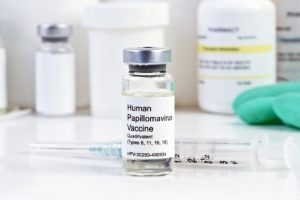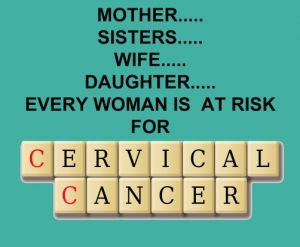Attention Women: 6 Must-Know Facts About Cervical Cancer
With cervical cancer continuing to affect women worldwide, it’s important to understand the disease known as a “silent killer” and what we can do to improve our chances of beating it.
Quick stats:
- Women of all ages are at risk of cervical cancer.
- In the United States, an estimated 13,000 women were diagnosed with invasive cervical cancer in 2016 and more than 4,000 women will die as a result of this diagnosis.
- Although the number of new cases has been declining over the past decades thanks to the Pap screening, cervical cancer is still the second most common type of cancer for women worldwide.[1]
Here’s a list of six facts you need to know about cervical cancer:
1. HPV is the #1 cause of cervical cancer.
To find a cure, it’s vital to know the causes. Most cervical cancers are caused by human papillomavirus (HPV), a common virus that can be passed from one person to another through sexual activity. Both men and women can be infected with HPV. It can be present for years without causing any symptoms and can be passed on to others without knowing.
The Centers for Disease Control reports more than 20 million people are currently infected with HPV worldwide, and another 6.2 million will contract the virus each year.[2] HPV has also been linked to other cancers, including cancer of the throat, penis, anus, vulva, and vagina.
2. Most cervical cancer cases are preventable.

Routine Pap testing is the best way to detect abnormal changes to the cervix before they develop into cancer. Much like removing polyps to prevent colon cancer, treating these abnormal cells can help prevent cervical cancer from forming. More than half of the women in the United States who get cervical cancer have never had or rarely had a Pap test.[4] The Pap test can also identify cervical cancer early – when it is in its most curable stage.
3. Only certain strains of HPV cause cancer.
HPV is serious – but not always a cancer indicator. HPV is a group of more than 150 related viruses. Most men and women who have ever had sex will get HPV at some time in their lives. And while there are strains that can cause cervical cancer and make it the top cause of the disease, as mentioned above, most HPV infections go away without treatment and are not linked to cancer.
4. Smoking and other factors increase the risk of cervical cancer.

There is also evidence that long-term use of oral contraceptives as well as being overweight increase risk of cervical cancer.
Women with a sister or mother who had cervical cancer are two to three times more likely to develop the disease. Talk to your doctor if you have a family history of cervical cancer.
5. There are warning signs, but not early warning signs.
Cervical cancer often presents no symptoms in its early stages, which is why it is often referred to as a “silent killer.” But as the disease progresses, warning signs may present themselves. Examples include pelvic pain, abnormal bleeding, painful urination, unusual discharge, abnormal menstrual cycles, pain or bleeding after sex, anemia, urinary incontinence, and back pain.[6] If you experience any of these symptoms, contact your doctor right away.
6. Genomics research helps us attack cervical cancer – and all types of cancer.
NFCR has distinguished itself from other organizations by emphasizing long-term, transformative research and working to move people toward cancer genomics and away from the old “location-based” research approaches.

Wayne Marasco, M.D., Ph.D.
Antibody Engineering
At NFCR’s Center for Therapeutic Antibody Engineering (CTAE), the research being conducted may end up being applicable for different types of cancer, not just renal cell carcinoma (one cancer type the research is centered around). The NFCR CTAE – is affiliated with Dr. Wayne A. Marasco’s Laboratory in the Department of Cancer Immunology & AIDS of Dana-Farber Cancer Institute, a teaching hospital affiliate of Harvard Medical School. The NFCR CTAE focuses on targeted immunotherapy and treatments through engineered human antibodies.
Dr. Marasco has had great success developing antibodies that attach to carbonic anhydrase IX (CAIX), an important tumor-associated protein highly expressed in renal cell carcinoma – the most common type of kidney cancer. Once attached, the CAIX antibody can halt abnormal cancer growth. Current NFCR research by Center Director Dr. Marasco and his team combines CAIX antibody with immune response activators to more effectively treat renal cancer. Moreover, there is demonstrated expression of CAIX in cervical, breast, ovarian, and lung cancers, in addition to various other types.
Research like Dr. Marasco’s has the potential to move quickly from its focus on one cancer type to diagnostic and treatment applications for many cancer types, such as cervical cancer.

Harold F. Dvorak, M.D.
Tumor Angiogenesis
Thirty years ago, NFCR scientist Dr. Harold F. Dvorak made the landmark discovery of the vascular endothelial cell growth factor (VEGF), which plays a central role in angiogenesis, the process by which tumors recruit blood vessels to supply the nutrients they need to grow and survive. Dr. Dvorak’s breakthrough led the research community to develop inhibitors of VEGF. One anti- VEGF targeted cancer therapy created has treated over 1.5 million patients with various types of primary and metastatic cancers. In 2014, this anti-VEGF antibody combined with chemotherapy was approved by FDA to treat patients with persistent, recurrent or metastatic cervical cancer. A comprehensive clinical program with more than 280 ongoing studies is investigating the use of the anti-VEGF antibody in over 50 tumor types, including more trials to treat patients with cervical and uterine cancers.
Sign-up to Stay Informed About Cancer Research Breakthroughs with NFCR!
[1] http://www.cancer.org/cancer/cervicalcancer/detailedguide/cervical-cancer-key-statistics
[2] http://www.webmd.com/vaccines/features/hpv-cervical-cancer-vaccine-15-facts#1
[3]
[4] http://www.cancer.org/acs/groups/content/@editorial/documents/document/acspc-044199.pdf
[5] http://www.cancer.org/cancer/cervicalcancer/detailedguide/cervical-cancer-risk-factors













